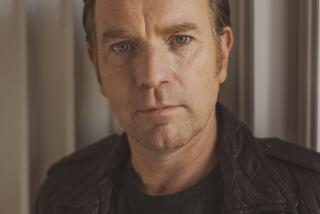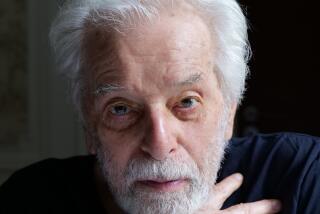PLEAUSRES AND PIIQUES OF SHOW-BIZ SUMMIT : Soviet, Hollywood Film Folk Mingle in Malibu--’Far Away From the Politicians’
- Share via
In 1966, Norman Jewison directed the very successful Cold War comedy “The Russians Are Coming, the Russians Are Coming.” Friday night they showed up at his Malibu beach house. Different Russians, of course: This time it was the delegation of Soviet film makers in Hollywood for the so-called “Entertainment Summit” arranged by author-producer Mark Gerzon.
The buffet supper at the Jewisons was a reunion of sorts. Jewison and television spokesman Vladimir Posner had met and talked in Moscow in 1966 when Posner was editing a magazine called Soviet Life and Jewison was there with “The Russians Are Coming.” (It was shown eight times in the Kremlin, he says.)
At the Moscow Film Festival in 1985, Jewison’s “A Soldier’s Story” shared the top prize with “Farewell” by Elem Klimov, newly elected chairman of the Soviet Cinematographers Union and the head of the summit delegation.
“Tonight,” Jewison told his guests, “we’re all here together, far away from the politicians and far away from the bureaucrats and we can speak honestly from our hearts. . . . And when I talk to directors about the studio, the struggle to get money, the fight to make their dreams and tell them . . . I see that all artists in all the world have the same problems. But we’re seeing life from our own hearts and our own minds, and we see it as truthfully and as honestly as we can.”
Klimov, whose rather austere appearance masks a dry wit, told the Malibu gathering with great affection that “on the last night of the (Moscow) festival, this man (Jewison) appeared at my door. He could play a peasant in my films. I understand he works on a Canadian kolkhoz (collective farm).” (Jewison owns a farm near Toronto that produces splendid maple syrup.) “He gave me a watch for divers, which he says is tested to 50 meters. I am still trying to test this idiotic watch. But I wish to everyone to have the same kind of good friend.”
The other Hollywood guests included Timothy Hutton and his very pregnant wife, Debra Winger; folk singer Theo Bikel (who played the ship’s captain in “The Russians Are Coming”); Denzel Washington from “A Soldier’s Story”; Whoopi Goldberg; Gregory Peck, and Robert Wise.
The previous evening, when part of the delegation had gone to inspect the facilities at the USC film school, Posner, actor Rolan Bykov and actress Ludmilla Chursina went to the Crossroads School in Santa Monica, where Gerzon’s wife, Shelley, is on the faculty.
It proved to be a very emotional evening, she says. Ten students made statements about their fears of nuclear holocaust and their hopes for mutual understanding that would reduce the risk of war.
Bykov talked about playing in the Soviet anti-nuclear film “Letters From a Dead Man” and experiencing a post-atomic world every morning for several days. There were tears.
Posner spoke on the need for more sustained contacts toward the goal of better and less mutually paranoid feelings, which is the underlying idea of the Hollywood visitation.
The progressive school, whose headmaster, Paul Cummins, had previously organized a summertime peace institute for high school students, is committed to the arts, and to social diversity and responsibility. Volunteer work is part of the curriculum.
“Things can begin with children,” Shelley Gerzon says, “and if you can’t begin to develop understanding at their age, we’re all in a lot of trouble.”
There were other reunions at the Jewison gathering. The guests included the handsome young actor Oleg Vidov, who had been called the Robert Redford of the Soviet Union but who defected and now lives in Los Angeles. Also on hand was the Soviet-emigre film maker Andrei Konchalovsky, who made a contemporary Russian epic, “Siberiade,” but who now lives here and has directed “Runaway Train,” “Maria’s Lovers” and “Duet for One.”
If there were estrangements, they didn’t show. In fact, what was clear from the jumble of conversations around the Jewison house was that the election of Klimov was an event of both real and symbolic importance, following as it did the ouster of some heavy-handed bureaucrats who had previously controlled film making in the Soviet Union.
The prospect of more freedom for film makers (and for film critics) is intensely tantalizing, and the fact that the delegation is here is regarded as deeply significant, whatever pragmatic immediate good results. The Gorbachev glasnost , or openness, is understood to be fragile but, like many fragile things, precious.
It is also clear that the Soviet film makers are after practical gains and not simply exchanges of good will. The directors Tolomush Okeyev and Eldar Shengelaya were noting that few Soviet films--and seemingly fewer than ever--are shown in the United States. The hope is for a wider interchange of films and for more co-productions.
If nothing else derives from the entertainment summit, there will have been a widened understanding that the frustrations of film makers for financing, creative control and distribution are universal.
“You think we have rockets, but we have many more good films,” Okeyev said, grinning, through a pretty young interpreter, a Russian-born actress named Raissa Danilov, now living here.
“ ‘Shoot Films Not Rockets’--now there’s a bumper sticker,” someone said. The translator wrestled with that for a bit, then Okeyev caught the sense of it.
“ Da !” he said.
More to Read
Only good movies
Get the Indie Focus newsletter, Mark Olsen's weekly guide to the world of cinema.
You may occasionally receive promotional content from the Los Angeles Times.










